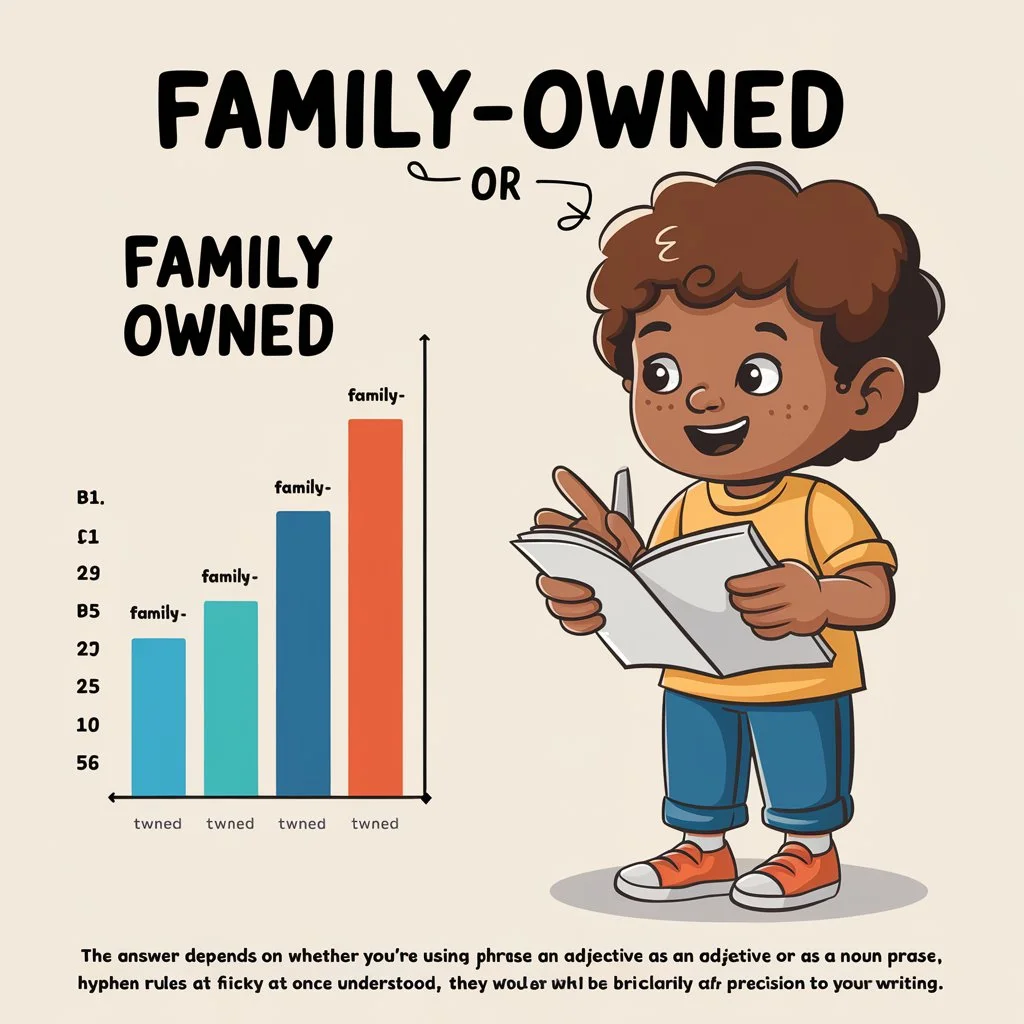Today, we’re focusing on a common question: Is “family owned” hyphenated? Hyphens play a crucial role in English writing, often helping to connect words in a clear, concise way. One of the most commonly asked questions about hyphenation is whether terms like “family owned” require a hyphen.
Learning about hyphens in English can be enjoyable once you grasp how they function. Understanding the rules for one word often means understanding them for many.
The answer depends on whether you’re using the phrase as an adjective or as a noun phrase. Hyphen rules can be tricky at first, but once understood, they bring clarity and precision to your writing. In this guide, we’ll break down the key rules of hyphen usage, focusing on when to hyphenate “family owned” and when not to.
Family Owned Or Family-Owned – Hyphenated Or Not?
When discussing the “family owned” hyphen rule, we hyphenate the two words when using them as an adjective to modify a noun. However, when using “family owned” as a standalone phrase noun, without modifying anything else, no hyphen is needed.
Examples Of When To Use “Family Owned”
Let’s examine some sentences where family owned is unhyphenated. In these cases, it is used as a phrase noun, not modifying any noun or object.
- This ranch is family owned.
- This home is family owned.
- The dog is family owned.
- We’re all family owned.
- I want my house to be family owned.
- This restaurant is family owned.
- The company has been family owned for generations.
- That house is family owned.
- Our farm is proudly family owned.
- I prefer businesses that are family owned.
- The vineyard is family owned and operated.
- This store has always been family owned.
- We only buy from family owned shops.
- Their boat has been family owned for over a decade.
- The land is still family owned despite the changes.
- The bakery is family owned and very successful.
- All the hotels in this chain are family owned.
- They pride themselves on being family owned.
- The small market on the corner is family owned.
- I love that this gallery is family owned.
Examples Of When To Use “Family-Owned”
Now, let’s look at examples where “family-owned” is hyphenated. Here, the phrase is used as an adjective to modify a noun or object directly.
- The family-owned barn across the road is out of commission.
- This is a family-owned hotel.
- We run a family-owned business.
- Where are the family-owned funds?
- You need help with the family-owned farm.
- The family-owned business has expanded across the country.
- They operate a family-owned restaurant.
- We stayed at a charming family-owned inn last summer.
- The family-owned farm has been passed down for generations.
- This is a family-owned company that values tradition.
- My friend works at a family-owned grocery store.
- The family-owned winery produces some of the best wines in the region.
- The family-owned bookstore is a local favorite.
- They live in a beautiful family-owned mansion.
- We bought our car from a family-owned dealership.
- The family-owned hotel offers excellent customer service.
- I prefer shopping at family-owned stores.
- The family-owned bakery is famous for its cakes.
- This is a family-owned construction business.
- The family-owned café is known for its homemade pastries.
Is Family Owned Hyphenated in AP Style?
According to the AP Stylebook, hyphenated words are used as adjectives. We combine two or more words with hyphens to clarify what they modify. When not used as an adjective, we simply write the words as a phrase noun without hyphenation.
Examples
- The family-owned bakery has been in operation since 1925.
- We invested in a family-owned construction firm.
- The family-owned hotel provided personalized service.
- They bought a family-owned car dealership in town.
- The family-owned business expanded to three new locations.
- We love dining at the family-owned Italian restaurant.
- The family-owned shop sells handmade crafts.
- Our neighborhood relies on a family-owned grocery store.
- The family-owned farm offers fresh produce daily.
- The family-owned bookstore has a cozy, welcoming atmosphere.
Should I Capitalize “Owned” In “Family-Owned”?
Capitalization rules vary based on the title style you choose. Here are the three primary styles:
- Style One: Capitalizes only the first word and proper nouns, leaving both “family” and “owned” in lowercase.
- Style Two: Capitalizes all words except for short prepositions, conjunctions, and articles. In this case, you would capitalize “family” but keep “owned” lowercase.
- Style Three: Capitalizes every word in the title, including both “family” and “owned”, regardless of their grammatical role.
Alternatives To “Family Owned”
If the hyphenation rules seem confusing, you might prefer to use alternative words. Here are some options that avoid hyphenation rules entirely:
- Familial
- Private
- Family-run (though this still uses a hyphen)
- Domestic
Quiz – Family Owned Or Family-Owned?
Let’s test your understanding with a quick quiz. Choose the correct form, A or B:
- We run a (A. family owned / B. family-owned) business.
- They say this school is (A. family owned / B. family-owned).
- I’m working with my dad on a (A. family owned / B. family-owned) farm.
- That house is (A. family owned / B. family-owned).
- These are (A. family owned / B. family-owned) roads.
Quiz Answers:
- B
- A
- B
- A
- B
FAQs
When should “family-owned” be hyphenated?
You should hyphenate “family-owned” when it’s used as an adjective to modify a noun or object. For example, in “a family-owned business,” the hyphen connects the two words to describe the business. If you’re not using the term to modify anything, it’s typically left unhyphenated. The phrase then stands alone, like in “this business is family owned.”
When should “family owned” not be hyphenated?
You don’t need a hyphen when “family owned” is used as a noun phrase without modifying any specific object. In sentences like “This home is family owned,” the phrase is used on its own. There’s no noun directly following it that needs description, so no hyphen is required. It stands as an independent clause in the sentence, describing ownership.
What is the general rule for hyphenating compound words?
The general rule for hyphenating compound words is to hyphenate them when they’re used as adjectives before a noun. Words like “well-known,” “high-quality,” and “family-owned” follow this pattern. When they are not modifying a noun, they are typically written as two separate words. This rule helps to avoid confusion and ensures your writing is precise.
Does the AP Stylebook support hyphenation in “family-owned”?
Yes, the AP Stylebook encourages using hyphens for compound adjectives like “family-owned.” This helps make the writing clearer, especially in journalism and professional writing. However, if the term isn’t modifying a noun directly, the hyphen is unnecessary. The AP Stylebook is known for simplifying hyphen rules, which is helpful for writers across industries.
Should “family-owned” always be capitalized in titles?
The capitalization of “family-owned” depends on the title style you’re using. In most styles, the first word is always capitalized, so “family” would be, but “owned” could remain lowercase. In title styles where every word is capitalized, both words would be written as “Family-Owned.” It’s important to be consistent in whichever style you choose for professional writing.
What are some alternatives to “family-owned” to avoid hyphenation?
If you’re looking to avoid hyphenation, there are several alternatives you can use. Words like “familial,” “private,” and “domestic” can be used in place of “family-owned.” Another option is “family-run,” though this still uses a hyphen. Using these alternatives can simplify your writing and avoid potential confusion around hyphenation rules.
Why do people sometimes misuse hyphens in phrases like “family-owned”?
Misusing hyphens often comes from a lack of understanding of how compound adjectives function. People may hyphenate words unnecessarily, especially when the phrase isn’t modifying a noun. In casual writing, this doesn’t always affect clarity, but in formal writing, improper hyphenation can confuse readers. Learning when to hyphenate, such as in “family-owned farm”, prevents these errors.
Can you give more examples of “family-owned” vs. “family owned”?
Yes, consider these examples:
- Family-owned: “They live on a family-owned ranch.” Here, the compound adjective describes the ranch.
- Family owned: “That ranch is family owned.” In this sentence, there’s no noun to modify, so the hyphen is not needed. This distinction is consistent across similar phrases where hyphenation depends on modifying a noun.
Conclusion
Understanding the rules for hyphenation in English is essential for clear and professional writing. When terms like “family owned” are used as adjectives to describe a noun, a hyphen is necessary to link the words. However, if you’re using them as a phrase noun, the hyphen isn’t required. Following these guidelines will help you write more accurately and avoid common errors. By mastering these hyphen rules, you can ensure your writing is both grammatically correct and easy to read.

I’m Mira Sinclair, the expert helping you navigate grammar sections at “Grammer Grove.” Playing with words and expressions is my thing. At Grammer Grove, we’re here to make yourwriting stand out and shine. Let’s make your appreciation heartfelt and memorable—come and join the fun at Grammer Grove!












